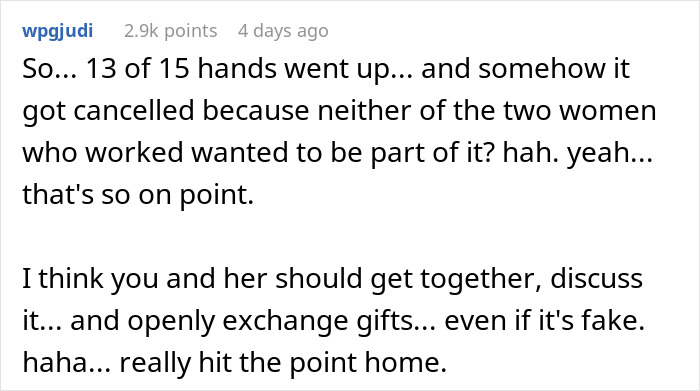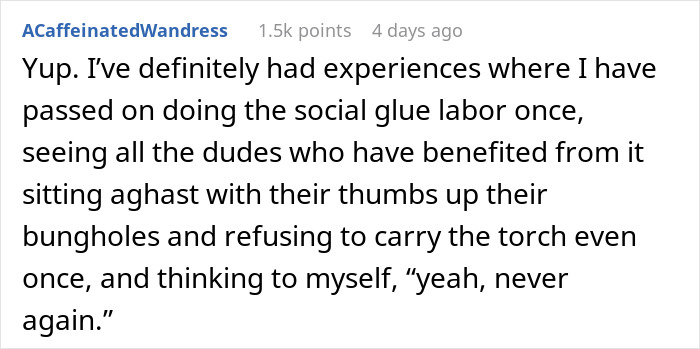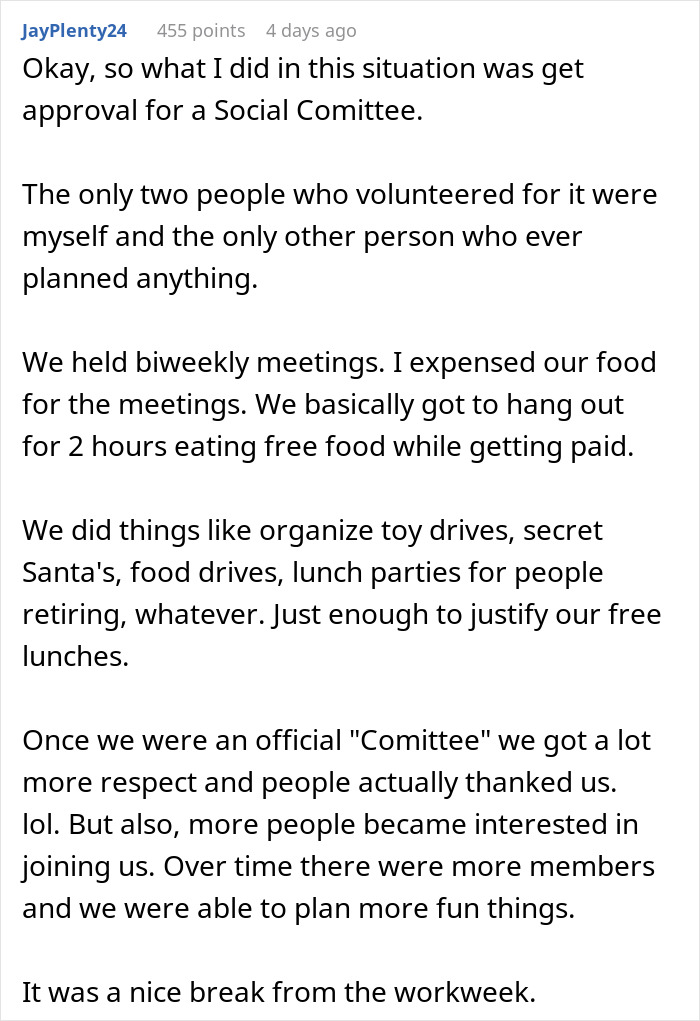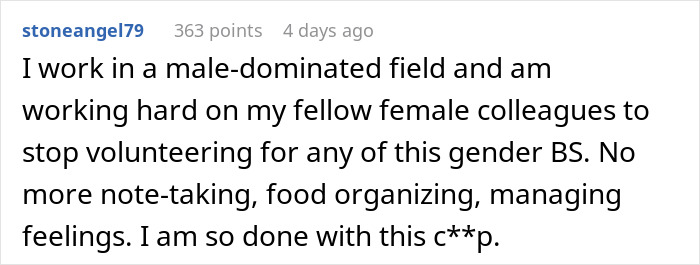It’s a strange world we live in. How else could you explain why people give celebrations a “gender”? Oddly enough, our society is so steeped in stereotypes that even a trivial team-building activity at work can get labeled as a “woman’s job.”
These female coworkers refused to take it anymore after being expected to put in extra labor to organize Secret Santa in their male-dominated field—every year. Their boss was taken aback by their refusal, and instead of asking male colleagues to do it, he just decided to cancel it altogether!
More info: Reddit
Weirdly, the whole world is developing quickly, yet gender stereotypes still prevail in our day-to-day lives

Image credits: Christina Morillo / Pexels (not the actual photo)
The poster works in a male-dominated field where she and another woman are the only female workers in a team of 15
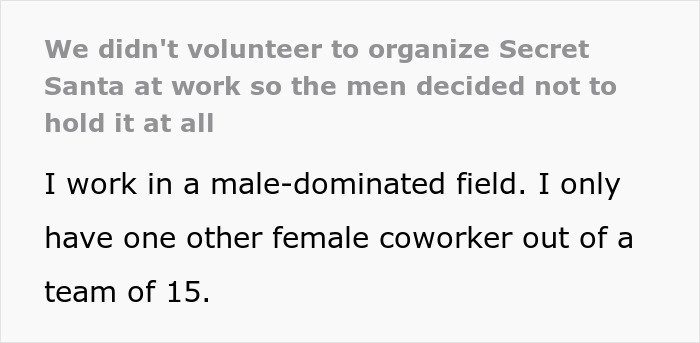
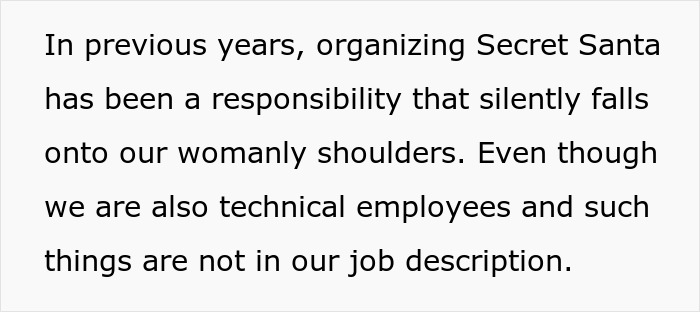
Image credits: Throuwuawayy

Image credits: cookie_studio / Freepik (not the actual photo)
Unfairly, every year, the responsibility of organizing Secret Santa falls on these two just because they are women, so they refused to do so this year
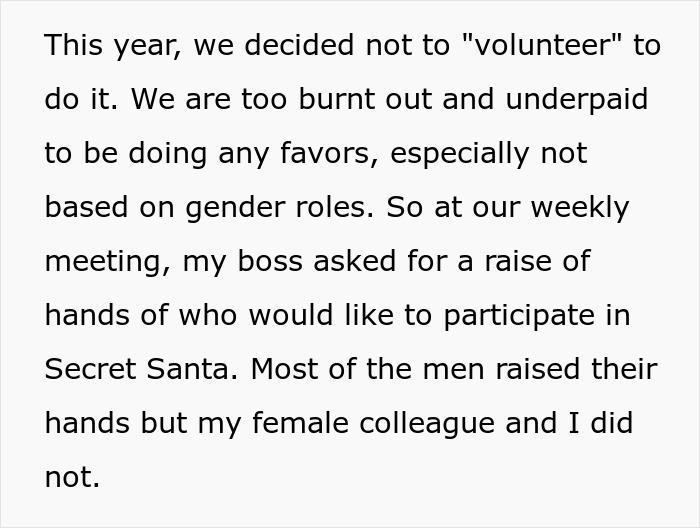
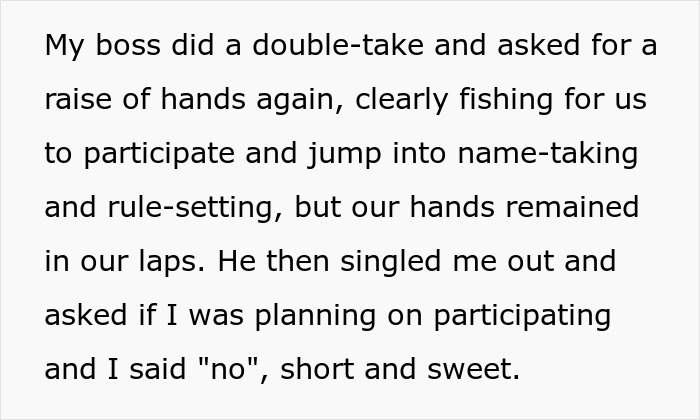

Image credits: Throuwuawayy

Image credits: fauxels / Pexels (not the actual photo)
Their boss was so shocked when they didn’t “volunteer” for it that he even singled the poster out, but she politely declined
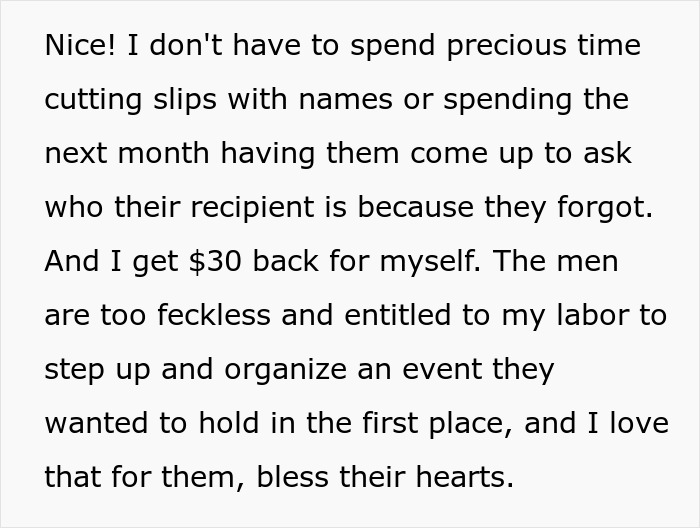

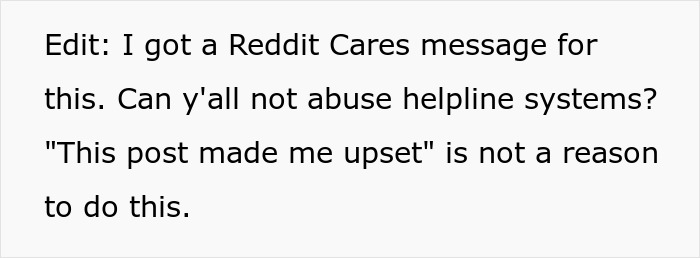
Image credits: Throuwuawayy
Instead of asking any of the men to arrange it, the boss straightaway canceled Secret Santa after the two women refused
Today, we dive into another workplace story where you will see the blatant gender discrimination that the original poster (OP) faced. She works in a male-dominated field with just one other female coworker in a team of 15, and organizing Secret Santa silently fell on their shoulders every year, even when it wasn’t in their job description.
Sadly, about four in ten working women (42%) in the United States say they have faced discrimination on the job because of their gender. The poster and her female coworker are part of this group, as they were expected to “volunteer” their extra labor without pay, reminding the men about their recipients while the men asked their wives to buy the Secret Santa gifts.
To gain a deeper understanding of gender discrimination and stereotypes in the workplace, Bored Panda interviewed Apoorva Kale, an industrial and organizational psychology practitioner.
She narrated that when additional tasks unrelated to the job fall upon marginalized groups or women, it can reinforce stereotypical views leading to assumptions that other groups are more competent and are making real contributions. As per her, these women might be perceived by others as not important or authoritative in the organization, undermining their professional credibility.
“This will affect their morale and workplace engagement, resulting in withdrawal, doubting their competency, lack of trust towards their leadership team, low self-esteem, and low work satisfaction. When employees feel less valued and deal with unfair responsibility distribution, job satisfaction will decline dramatically as a result of decreased motivation.”
“Being assigned disproportionate responsibilities, employees will feel a sense of dissatisfaction, frustration, and lost sense of professionalism, this will also lead employees to resign and look for jobs with respect, appreciation, and equality, increasing the turnover rates,” Apoorva added.

Image credits: Aminaashfaq / Freepik (not the actual photo)
The poster and her female colleague were also fed up with this additional, unpaid task, already burned out by their work. They finally decided to take action and didn’t raise their hands when their boss asked who wanted to participate in Secret Santa this year. Well, this surprised him, so he singled out the OP, but she politely declined.
Now, this man completely ignored the men who had raised their hands and declared, “I guess we are passing on Secret Santa this year.” When the story went viral, folks were simply baffled by the boss not even thinking of asking the other men to do it, calling out his discriminatory behavior.
Apoorva explained that when informal responsibilities like event planning are dumped on women as compared to their male counterparts, there’s a shift in the team dynamics as well, which might impact the work environment. The poster’s decision to stop being forced into organizing the event seems like an amazing decision, and many women applauded her.
We also spoke to Apoorva about how organizations can ensure that non-job-related tasks, like event planning, are distributed equitably, rather than defaulting to gendered expectations. She said that to avoid any gender-related disparities, the organizations should promote inclusivity, fairness, and transparency, which can be addressed by creating guidelines.
“These guidelines should define how non-job-related tasks should be assigned based on interest, skill set, and availability, encourage participation by all the employees of the organization by providing rotating volunteering schedules to avoid any implicit bias, check in with the teams regularly and track what tasks are being completed to avoid unfair distribution of responsibilities,” Apoorva advised.
Well, that does sound like a wonderful solution, which might help organizations navigate these events without making women feel discriminated against. Wouldn’t you agree? Have you ever experienced something similar at work? Feel free to narrate your stories in the comments below.
Netizens didn’t hesitate to call out the gender bias at the poster’s workplace and her discriminatory boss



